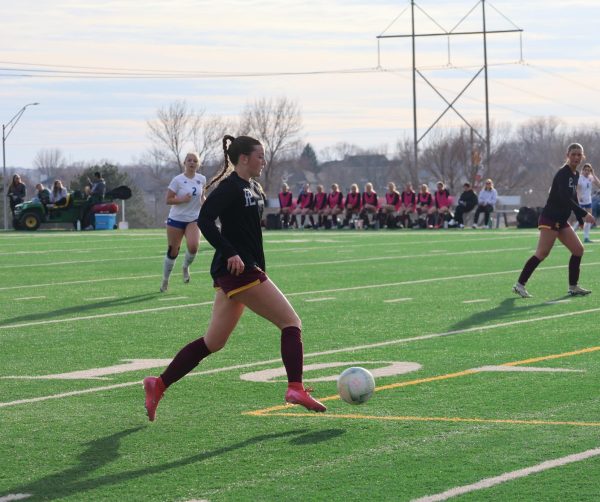Mental Health in Student Athletes
Junior Jordyn Bahl prepares to pitch at the state softball tournament.
Cleats, shin guards, socks, shorts, jersey. This is the list of equipment that a soccer play may need for a game. This list would be very different for a volleyball player, a softball player, or a football player. While this equipment differs, there is one thing that all athletes need for a game or a meet. Their mind.
It is important for anyone to have a healthy mind. For student athletes, there are some things that can make this very difficult. Mental health issues are very common in high school athletes and there are many factors that can lead to these issues.
Extreme stress is something that many athletes suffer from. This can lead to depression, anxiety, and more. Student athletes have to focus on their schoolwork and their sport, while also maintaining a social life. This is a lot for a high schooler. So, what are athletes doing to prevent mental issues from developing?
Senior Erica Broin is a three-sport athlete and is taking 4 AP classes this year. Her mental health is something that she keeps an eye on.
“I think mental health is extremely important for athletes because sports can be so mentally taxing,” Broin said. “You have to be in a place where you can remain positive with yourself when you’re playing bad, which is something I struggle with.”
In order to do this, Broin works on taking time to herself, especially in between seasons.
One cause of mental issues in student athletes is pressure. Pressure on athletes can come from parents, coaches, teammates, or even from themselves. At times, Broin struggles with putting too much pressure on herself.
“When it comes to pressure, you have to do your best to control it and not let it get to you,” Broin said. “Many people, including myself, are their own worst critics and if you let that get to you then it will affect the way you play.”
Other factors that can affect athletes include lack of playing time, burnout, which is the loss of interest in a sport, injury, and sometimes outside problems with friends or family. For Broin, sports do not contribute to her problems in her outside life, they serve a different purpose.
“One of the reasons I love sports so much is because it can serve as an outlet from things happening in my life at the time,” Broin said.
Junior Jordyn Bahl is another athlete who has to keep her mental health in mind. Bahl is currently taking 1 AP class, with the rest of her classes being honors. She is the pitcher of the varsity softball team where she has helped the team to two state championships in the last three years.
Similar to Broin, Bahl attempts to not let pressure get to her. Instead, she turns it into something positive.
“Feeling pressure from people that you know want you to succeed can be a good thing,” Bahl said.
Just like pressure, lack of sleep can lead to athletes not performing well. Student athletes can easily struggle with getting the right amount of sleep because of how busy they can be at times.
For example, Bahl spends some of her nights giving lessons, then practicing on her own, and finally getting to her homework. This leads to a late night for her, which turns into a bigger problem.
“Due to lack of sleep one night, I feel [tired] the rest of the week,” Bahl said. “[This can make] it hard to remember what I’ve learned and to soak in what I am trying to learn.”
Getting enough sleep is vital for an athlete. There are other important things that Bahl believes are important to an athlete’s success. This includes finding other hobbies and keeping in mind that there are bigger things than sports.
“[We have to] allow ourselves to be the kid that we all are,” Bahl said.
Another concern with the mental health of student athletes is game day. Generally, a game day takes place on a school day. Athletes are expected to sit through class all day long and then go play their game. Both Broin and Bahl admit to having little focus in class on a game day.
“On a game day I really don’t have the best focus,” Bahl said. “I still get stuff done but not as efficiently, and I’m visualizing the game so school is not getting the attention that it should.”
Broin echoed Bahl’s thoughts about focus during a game day.
“My focus during class on game days is not great especially on big game days because I just get really excited to play,” Broin said.
If athletes are taking a test on the day of a game, they will most likely not be 100 percent focused. While some athletes may be able to control their focus, others cannot. Poor grades can add up and that just leads to more problems for athletes, such as ones with their mental health.
Mental disorders are very common in student athletes. It is important for athletes to be aware of their mental health and find ways to help themselves.
An athlete would never want to forget a piece of their equipment for a game. They also need to take good care of their equipment. The same thing goes for their mind.
Caitlyn Ryan is one of the Sports Editors for the Scepter and PLPulse. This is her junior year and her second year on staff. She is in the Health Academy...











